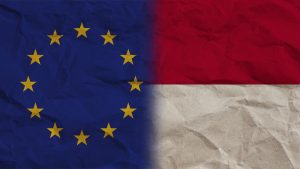The European Union and Indonesia yesterday reached an agreement to move ahead on a free trade deal, which is set to strengthen economic ties between two of the world’s largest economies at an uncertain time for the global trading regime.
In a statement yesterday ahead of a joint appearance with Indonesian President Prabowo Subianto, European Commission President Ursula von der Leyen said that the two sides “reached a political agreement to advance the trade agreement.” She said that in a “volatile world,” Europe and Indonesia had chosen “a path of openness, partnership, and shared prosperity.”
“The agreement will open new markets and create more opportunities for our businesses. It will also help strengthen the supply chains of critical raw materials, essential for Europe’s clean tech and steel industry,” she said.
Prabowo, who arrived in Brussels on Saturday night, said that the two sides were “ready to finalize” the agreement, which would “support our efforts to grow our industries, create jobs, and strengthen our sustainable development goals.” Speaking alongside von der Leyen, Prabowo added that the economic partnership between Europe and Indonesia “will make a very important contribution to the economic and geopolitical stability in the world.”
Once the Comprehensive Economic Partnership Agreement (CEPA) is finalized, the EU will remove many of its tariffs on Indonesian goods, chief economics minister Airlangga Hartarto told reporters from Brussels yesterday, describing the agreement as a “milestone.” He added that the final signing of the agreement is expected in the third quarter of 2025, pending a formal announcement from Prabowo.
The CEPA between the EU and Indonesia, which covers 21 areas of cooperation, including trade in goods and services, investment, customs procedures, digital trade, and sustainable growth, has been under negotiation since July 2016. However, the talks have run aground on a number of disagreements relating to Indonesia’s protectionism and the European bloc’s policies toward palm oil, a key Indonesian export, including a deforestation regulation adopted in 2023. The two nations have also engaged in trade disputes over Jakarta’s nickel export ban and the EU’s imposition of anti-dumping and countervailing duties on certain types of Indonesian stainless steel products.
But as I noted back in June, when the two sides announced the completion of the bulk of the negotiations for the CEPA, Jakarta and Brussels have had increasingly urgent strategic incentives to finalize the agreement. The most significant of these pertains to the Trump administration’s aggressive tariff policy, which both Prabowo and von der Leyen referenced indirectly during their comments in Brussels yesterday.
Indonesia was hit with a 32 percent tariff during Trump’s “liberation day” tariff announcement on April 2, a rate that was reaffirmed by the U.S. president last week and is now set to come into effect on August 1.
In a letter to President Prabowo announcing the tariff decision, Trump said that he remained open to changing his mind if Jakarta got rid of its tariffs and non-tariff barriers. “These tariffs may be modified, upward or downward, depending on our relationship with your country,” he wrote to Prabowo.
Trump’s announcement came as a shock to Jakarta, following as it did a series of proposals from Indonesia aimed at helping reduce the U.S. trade deficit – the ostensible cause of the high U.S. tariff. These include a promise to spend $34 billion on “new Indonesian investments and purchases in the United States,” including significant purchases of agricultural products, energy, and Boeing aircraft, among other goods. Jakarta has also hinted that this will include a major U.S.-bound investment involving its new sovereign wealth fund, Danantara.
While en route to Washington to meet with U.S. officials, Indonesia’s chief economics minister Airlangga Hartato told the Washington Post that the decision to maintain the 32 percent tariff was “a surprise.”
“We have been moving 180 degrees, and the U.S. is not moving at all – zero,” he said. “There were a lot of things we had already discussed in detail.”
The EU, too, faces a tariff of 30 percent on its exports to the U.S., which is also due to come into effect on August 1.
During her press conference with Prabowo, von der Leyen said that there was “a lot of untapped potential” in the trade relationship between the EU and Indonesia. “The new agreement will open new markets. It will create more opportunities in key industries. Business activities in agriculture, automotive, and services will massively benefit from it,” she said.
The agreement is a sign that even before entering into effect, Trump’s tariffs have prompted a reordering of global trade – though not necessarily one that will redound to the long-term benefit of the United States.

































